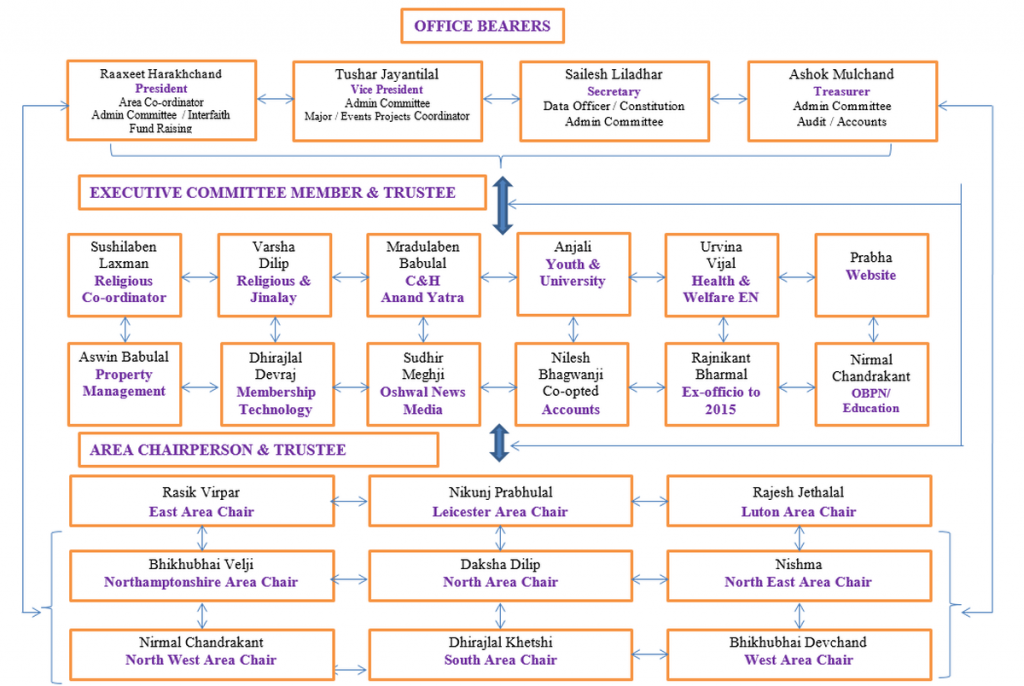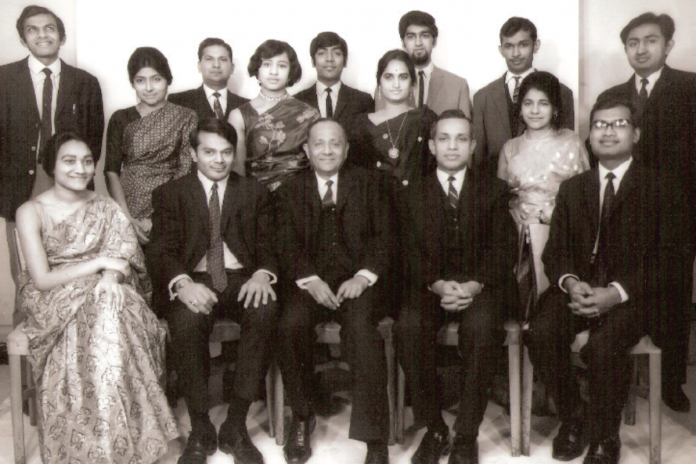Here are some of the most common questions that people have about Oshwal and what is involved in getting involved.
Current Structure

Executive Committee – Known as EC
This is an elected body. They comprise of:
- 4 Office Bearers. President, Vice President, Secretary, Treasurer.
- 12 Committee Members
- 9 Area Chairpersons
Collectively, these are the trustees of Oshwal Association and are bound by the constitution and the rules of The Charity Commission. The 9 Area Chairpersons report to the EC on Area matters and in turn inform their respective Area Committees on EC deliberations that are pertinent to the Area / Members.
What do they do?
- This is the central body that runs the Association, giving guidance to the Areas, reviews and approves budgets, expenditure etc; and also planning major events and the future direction of the community.
- They are allocated portfolios which are generally mirrored by the Areas.
- Key portfolios are:
- Religious
- Education
- Property Management
- Health & Welfare including Enabling Network
- Publication & Media
- Culture & Heritage
- Fund Raising
- Membership
- Oshwal Business & Professional Network
- Youth
- Other Portfolios are often managed by the Office Bearers which include
- Administration – (Staff & Operations)
- Constitution
- Accounts & Audit
- External Relationships
- Area Co-ordination
Duties are allocated to the elected members and often the role is shared by more than one Trustee as this help ease the workload. In turn each portfolio holder creates a sub-committee comprising of the Area counterpart who has been allocated the same role and additional Oshwal Members who form a part of the subcommittee / working committee.
How often does the EC Meet?
- At least once a month, usually 1st or 2nd Friday of each month at 8-30pm. Normally at Oshwal Centre, although we do try and visit other Areas from time to time.
- Format – Agenda circulated in advance together with minutes of the previous meeting, reports for portfolios and budgets are also submitted in advance to the secretary and are read before the meeting, then discussed, approved / authorised as appropriate.
The role of Trustee is very important and requires clear thinking and a degree of willingness to understand perspectives and look at matters objectively. Whilst all opinions are valued, ultimately decisions are taken based on the consensus and at times it may not be your view, we work on the basis that once a decision is approved, we all support that decision.
There is a huge degree of trust placed on the EC. To be fair, impartial and to always work in the best interests of the Association.
Area Committees
There are 9 Area Committees:
- East
- Leicester
- Luton
- Northampton
- North
- North East
- North West
- South
- West
What do they do?
- The Areas are the backbone of Oshwal Association
- They are all elected at local Area AGM’s to serve a 2 year term
- The Committee Comprises of 4 Office Bearers – Chair, Vice Chair, Secretary, Treasurer
- Up to 12 Area Committee Members are elected. Some Areas elect less, some co-opt additional members where workloads demand extra help
- The Area Chairperson is automatically a Trustee and is expected to attend the monthly EC Meeting
- Portfolios mirror the EC, although in smaller Areas, these are often merged or not formally appointed. In turn each portfolio holder creates a sub-committee comprising of the other Area Committee members and additional Oshwal Members who form a part of the subcommittee / working committee.
How often does the Area Committee Meet?
- At least once a month, dates are set locally to suit each Area.
- Venues can be any of our centres or locally for outlying Areas.
- Format – Agenda circulated together with minutes of previous meeting, reports for portfolios are discussed, events planned and budgets are prepared / approved and then submitted to the EC for authorisation as appropriate.
- The Area Chair as Trustee, reports to the Area Committee on the last EC Meeting, highlighting any key points, directions and matters relevant to the members.
- The Area Secretary sends copies of all minutes to the EC Secretary.
- The Area Treasurer works closely with the EC Treasurer & provides timely reports on local finances.
The Area Committees are essential to the workings of OAUK. They provide local services, arrange activities and events at a local level to engage with our members. As such they are in closer touch with Oshwal members in the Area. This role is very important, local activities bring the community closer and this fosters a stronger degree of unity. The role requires, enthusiasm, a desire to do something and a willingness to understand perspectives and look at matters objectively. At Area level, it is more important that the committee works as one. Decisions are taken based on the consensus and whilst at times it may not be your view, we work on the basis that once a decision is approved, we all support that decision.
Working as One
Day to day, Areas arrange a regular format of events which to vary from Area to Area. There are a lot of common events held at local level and Areas do share ideas on how to do these better. At times, joint Area events are held, this is to be encouraged more, as many hands make work easier and target audiences are much wider.
Major events include:
- Key event – Mahavir Jayanti, Paryushan, Ayembil, Savantsari Bhojan
- Regular events – Music / Social programmes, health & welfare lectures / demonstrations, outings, youth and elderly events.
- Special events – decided by Areas
- Joint central events – usually one or two a year – Diwali, Savansari / Dhaja Dhin and planned events as directed by the EC.
What is my commitment?
Depending on where you get involved:
- The commitment is to certainly attend meeting.
- To support the committee.
- To actively work your portfolio and create a strong team to help you.
- To do your best and to look to others with experience to help you where necessary.
- Give your time and passion to want to help and make a difference.
What are the pro’s & cons of getting involved?
Again, depending on where you get involved:
- You will meet a huge number of people, who over time will get to know you really well.
- You will make many new friendships that are close and will be lifelong friends.
- The work offers a huge sense of satisfaction, particularly when it goes well.
- You will learn so much about our community, culture, history and heritage.
- Community work offers a true sense of purpose and personal development in an otherwise very routine lifestyle that most people lead.
- You will learn new skills that are transferrable to your work or other organisations.
- It’s addictive, once you get involved, if you embrace it, you will want to stay on and work for the community.
So what are the downsides?
- Actually very few
- A degree of commitment is required and not something that should be done half-heartedly.
- Giving up some of your personal time (but it is always possible to achieve a good work/life balance)
For more information, please contact:
President: rex.shah@oshwal.org
M: 07973 533 660
Vice President: tj.shah@btconnect.com
M: 07816 430808
Secretary: sailesh.shah@oshwal.org
M: 07985 432270
Treasurer: ashok.shah@talktalk.net
M: 07957 563164

